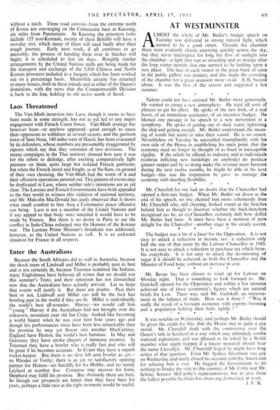AT WESTMINSTER
ALMOST the whole of Mr. Butler's budget speech on Tuesday was delivered in strong natural light, which seemed to be a good omen. Outside the chamber there were evidently clouds scurrying quickly across the sky, but they never interrupted for long the flow of sunlight into the chamber—a light that was so revealing and so strange after the long winter months that one seemed to be looking upon a new place. The face of each visitor in the great bank of seats in the public gallery was distinct, and this made the crowding of the chamber for a great occasion more vivid. A fly buzzed about. It was the first of the season and suggested a hot summer.
* * * * Nature could not have assisted Mr. Butler more generously. He wanted to create a new atmosphere. He tried all sorts of phrases to get his effect. He spoke of the new look, of a real boost, of an immediate quickener, of an incentive budget. Ho likened one passage in his speech to a new movement in a symphony. He spoke of getting out of slack water, lightening the ship and getting aweigh. Mr. Butler understands the mean- ing of words but seems to miss their sound. He is no orator. Nevertheless on Tuesday he succeeded triumphantly with his own side of the House in establishing his main point, that the economy need no longer be thought of as fixed in inescapable rigidity. If the reliefs he offered to industry and to individuals (without inflicting new hardships on anybody) do produce greater output and by so doing make the revenue more buoyant during the next twelve months, he might be able in his next budget—this was the impression he gave—to manage the economy with dazzling flexibility. * * * * Mr. Churchill for one had no doubt that the Chancellor had opened a first-rate budget. When Mr. Butler sat down at the end of his speech, no one cheered him more vehemently than Mr. Churchill who, still cheering, looked round at the benches behind him as though to discover whether the back-benchers recognised (as he, an ex-Chancellor, certainly did) how skilful Mr. Butler had been. It must have been a moment of pure delight for the Chancellor—another stage in his steady ascent. * * * * The budget was a bit of a facer for the Opposition. It is not easy to attack a reduction in income tax—a reduction only half the size of that made by the Labour Chancellor in 1945. It is not easy to attack a reduction in purchase tax which bene- fits everybody. It is not easy to attack the de-rationing of sugar if it should be achieved, as both the Chancellor and the Minister of Food hope, without an increase in cost. * * * * Mr. Bevan has been chosen to wind up for Labour on Monday night. That is something to look forward to. Mr. Gaitskell opened for the Opposition and within a few minutes achieved one of those economist's figures which are natural briefs for Low. There was, said Mr. Gaitskell, an improve- ment in the balance of trade. How was it done ? " Was it really the result of a buoyant economy with exports booming and a population holding their belts tightly 2 " . * * * * It was notable on Wednesday, and perhaps Mr. Butler should be given the credit for this, that the House met in quite a gay mood. Mr. Churchill dealt with the controversy over the Queen's title in Scotland in a way which may ultimately soothe national aspirations, and was pleased to be asked by a Welsh member what might happen if a future monarch should bear the name Llewellyn. Mr. Churchill hoped he might have long notice of that question. Even Mr. Sydney Silverman was gay on Wednesday and neatly closed his account with the Americans for refusing him a visa. He begged the Government to do nothing to hinder the visit to this country of Mr. Cohn and Mr. Schine, Senator McCarthy's representatives, but to give them the fullest possible facilities for observing democracy at work. J. F. B.


































 Previous page
Previous page